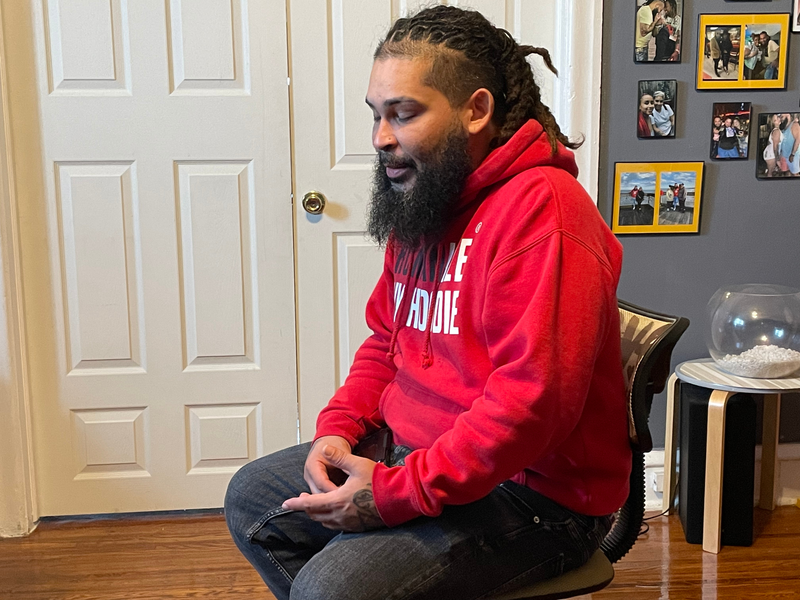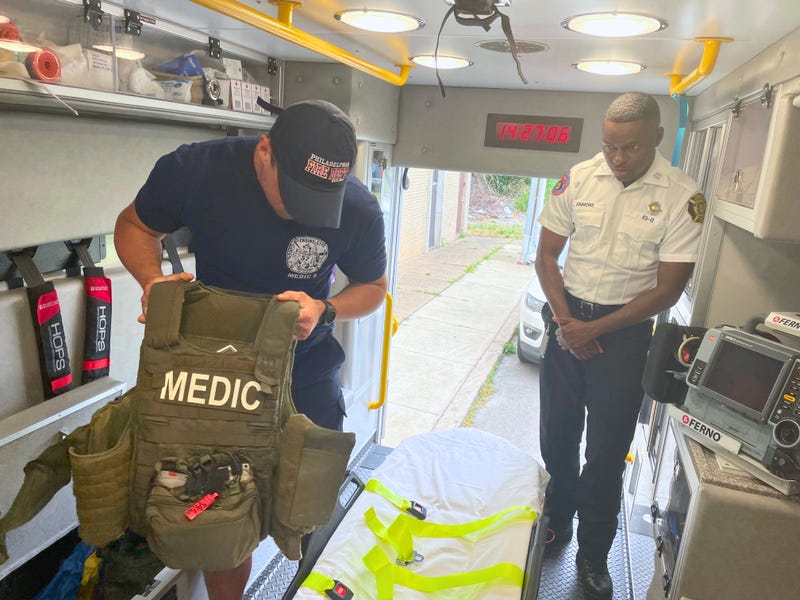
🎧 LISTEN TO RICOCHET, A LIMITED PODCAST SERIES ON PHILADELPHIA’S GUN VIOLENCE CRISIS
PHILADELPHIA (KYW Newsradio) — On Nov. 11, 2018, the Eagles lost to the Cowboys at home — a terrible day for most fans, but for Luis Berrios, it was one of the best nights of his life. It was his first Eagles game.
“I had an amazing time,” he remembered. “We were behind the field goal.”
After the game, he and his friend took a train back home to Hunting Park, where they stopped for some late-night Chinese takeout. But that’s when one of the best nights of Berrios’ life became his worst.
“I felt something like they threw a rock at me in my back,” he said. “It didn’t hurt it. … I felt a lot of pressure but never felt the bullet enter me at all.”
As he got to his stoop and pulled out his keys, he was shot in a suspected attempted robbery by two men. The bullet pierced Berrios’ intestines and other organs. The shooting remains unsolved.
The doctors and medics
Dr. Amy Goldberg has been a trauma surgeon for three decades. She is the dean of the Lewis Katz School of Medicine at Temple University.
Goldberg said patients who have been shot routinely ask doctors if they are going to die. Berrios asked that question, too.
“I always answer no,” she said, “we’re going to take good care of you, we’re going to get you to the operating room.”
In the media, shooting victims are often reported as being in stable or critical condition, but their injuries go far beyond those one or two words.
“You can be shot just once and die, or you can be shot 14 times and live, depending upon the caliber and where the wounds are. But make no mistake: All wounds cause destruction,” said Goldberg.
“I want the world to see what patients look like when they’re shot and what bullets do to bodies. … I am convinced if this world saw those pictures, we would have some real change.”

Due to the increase in high-caliber weapon use, medics have more tactical gear than ever before. Michael Simmons, the fire paramedic captain for West and Southwest Philadelphia, said he has seen a steady increase in people being shot over the last few years, with no discrimination — men and women, teenagers and toddlers.
“You might pull up thinking you’re only going to get one victim out there and it turns out to be three, four, five victims,” he said. “Now you have a whole neighborhood that’s affected because so many people got shot just from one person making a decision.”
Gunshot victims don’t just go to the hospital, get stitched up, and go home. There are deeper issues to face down the road — physical, emotional, psychological, mental.
“You’re taking a piece of somebody that they can’t get back,” Simmons added. “While we can sit there and try to patch up that hole to try to hold you together, they can never get that piece of them back after a traumatic event like that.”
The trauma
Berrios had never been involved in violence until the night he was shot. The bullet pierced his lung, intestines, bladder, liver, colon and pancreas. He is still recovering more than five years later. He had to go through several surgeries and still lives with pain and PTSD.
“I would never be the same. Never be the same, ever,” he said. “From what I eat to how I go throughout my day, will never be the same.”
Every night for months, Berrios would dream about getting shot. He’d wake up and feel the sting of the bullet.
“I hear about people getting shot and they get up and they’re back on the street. And I ask the question, how? When I’m constantly scared. I don’t feel safe.”
LISTEN TO EPISODE 3: THE WOUND
Gun violence continues to plague cities across the country. Philadelphia is one of the cities suffering the most. One gunshot can reverberate through a neighborhood, or a city, and leave lasting impacts on communities.
In the third episode of Ricochet, “The Wound,” hear more about Berrios’ story as well as the physical impact of getting shot, the mental trauma that stays with a victim, and how advocates help people work through that trauma to turn their lives around.
In upcoming Ricochet episodes, hear from those who have been shot, those who lost loved ones — and even those who pulled the trigger. Follow Gone Cold: Philadelphia Unsolved Murders. Episodes will be released every Wednesday on the Audacy app or wherever you get your podcasts.
Article written by Rachel Kurland. Podcast written and hosted by Kristen Johanson and produced by Sabrina Boyd-Surka, with production assistant Winston Harris.
Read more from Ricochet here
CORRECTION: A previous version of this article mischaracterized Dr. Amy Goldberg as running the emergency room at Temple University Hospital.
